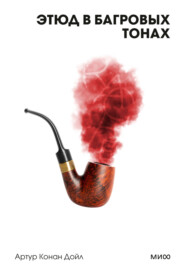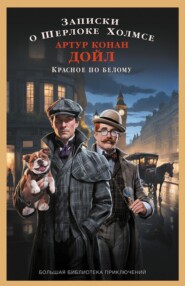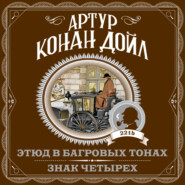По всем вопросам обращайтесь на: info@litportal.ru
(©) 2003-2025.
✖
Arthur Conan Doyle: A Life in Letters
Настройки чтения
Размер шрифта
Высота строк
Поля
Michael Conan to Arthur Conan Doyle PARIS, JULY 7, 1867
My dearest Laddie
I am happy to have an opportunity to send you the accompanying book—from which, I hope you will derive not a little pleasure and that, I know, you will value more, instruction. It is a very sketchy little history of France, with coloured illustrations, giving portraits, in their various costumes, of the Kings and Queens of that country, from the earliest up, even to the present time. You will find gratification in studying these attentively—and, I feel sure that, with the instruction of your dearest Mama who is so well acquainted with the French language, you will, at no distant time, become acquainted with it and thus read the text, by which you will be more especially introduced to their Majesties.
Believe me to be
My Dearest Laddie
Your loving Godfather
That autumn Arthur left Edinburgh for England, and a Jesuit education. It was a big change, but in some ways a welcome one. ‘Of my boyhood I need say little,’ he wrote in Memories and Adventures, ‘save that it was Spartan at home and more Spartan at the Edinburgh school [Newington Academy] where a tawse-brandishing schoolmaster of the old type made our young lives miserable. From the age of seven to nine [sic] I suffered under this pock-marked, one-eyed rascal who might have stepped from the pages of Dickens. In the evenings, home and books were my sole consolation, save for week-end holidays. My comrades were rough boys, and I became a rough boy, too.’
He spent the next two academic years at Hodder House, a preparatory school for Stonyhurst College in Lancashire, and another five at Stonyhurst itself, established in 1593 as one of England’s two foremost Roman Catholic schools for boys.* (#ulink_9342cf34-3cec-5ec9-a3fb-52618eabcd2a) He was only eight years old when he travelled by train to Preston, Lancashire, the nearest station. ‘It was a long journey for a little boy who had never been away from home before,’ he recalled, ‘and I felt very lonesome and wept bitterly upon the way.’ He put on a brave face nonetheless in frequent letters home to his mother, and occasional ones to his father.
to Mary Doyle HODDER HOUSE, OCTOBER 13, 1867
dear mama I am getting on nicely the only thing i find at all difficult is my Latin Exercise but I will soon be accustomed to it I and 2 other boys had a constaio [sic] and I won 1 of them and was equal to another. I am to get a nice little bible picture for winning—my love to everybody except Mrs Russel* (#ulink_e700be8e-1fbe-5c04-9f9d-bbc758131ef7)—did lottie get the little picture?
I am ever your own boy.
A Conan Doyle
to Mary Doyle HODDER HOUSE, MARCH 28, 1868
I hope you are quite well I send some little french foot soldiers for cony and lottie (#ulink_db5c47b8-7e4e-53f8-8c1e-dc424d6a2349) please write soon, many thanks for the little whale, we are in the midst of the easter holiday. I hope tot is getting on nicely at school (#ulink_272b5457-6f54-5f64-b6ca-9a3a7bcd613f) I am having the greatest fun cricket is such a jolly game.
When he entered his second year at Hodder he settled into the rigorous academic routine, but to his delight the ‘rough boy’ from Edinburgh also began to excel in sports. ‘I could hold my own both in brain and in strength with my comrades,’ he later recalled. Cricket became a consuming passion for the rest of his life, and he played many other sports also. Although he felt the separation from his family keenly, he was grateful for the encouragement he received from some of his masters. ‘I was fortunate,’ he recalled, ‘to get under the care of a kindly principal, one Father Cassidy, who was more human than Jesuits usually are.’
As Christmas approached at the end of 1868 he was among the boys who remained at school under the staff’s care. Why is not spelled out, though he was not the only boy to spend Christmas holidays at school, and it was most likely due to the expense of travel. He wrote home eagerly anticipating a package of food that would sustain him through the several holiday weeks. His first communion in May was a landmark.
to Mary Doyle HODDER HOUSE, DECEMBER 13, 1868
I did very well this term I was Distinguished and any boy that gets Distinguished 3 times during the year gets what is called the good-day they can do what they like they fish they hunt they bath they go walks they do what they like for a prize I have got these marks 55 for arithmetic I am not sure what I got for the examen but I think I got about 100 For compositions 359 for this term so that im in a pretty fair way for a prize I send you my compositions just to let you see how Im getting on at christmas we get into company’s of 3 or 5 and each boy gives a little of his christmas box to his neighbour and the neighbour gives him a bit of his I have got three in my company Remember mama to send my box to red Lions inn* (#ulink_fab14461-8d33-578e-8d6c-2d8d5f303457) on the twenty third I hope tots is getting on nicely and has Coney got her first tooth that tooth seems to be asleep because it never comes however I hope it will come by christmas day
to Mary Doyle HODDER HOUSE, MAY 30, 1869
I am glad to say that I have made my first communion Oh mama I cannot express the joy that I felt on the happy day to receive my creator into my breast I shall never though I live a 100 years I shall never forget that day.
‘Three cheers for the holidays,’ he scribbled at the end of a note dated August 1st about packing up at the end of the school year. Following his annual summer holiday at home, he returned in September 1869 to begin his studies in the ‘grand medieval dwelling-house’ of Stonyhurst College. ‘It was the usual public school routine of Euclid, algebra and the classics,’ he later said, ‘taught in the usual way, which is calculated to leave a lasting abhorrence of these subjects.’ In letters home, however, he concealed any distaste he felt for his studies, and appeared determined to succeed.
to Mary Doyle STONYHURST, SEPTEMBER 19, 1869
I have arrived all safe—I suppose my luggage is safe and sound at stonyhurst We got our books yesterday, we have got The history of Caesar for Latin translation and parsing, a greek grammer, poetry, Latin Grammer, a french author, Catechism, English history, and other books my love to Papa and the brats has Lottie cryed at all after me
to Mary Doyle STONYHURST, NOVEMBER 14, 1869
I have bad news to tell you two poor boys have died at stonyhurst within the last 3 weeks from getting croup, to my great delight 50 new books have been bought for the library, we go to communion every second sunday I went this morning. I am in the 1
class arithmetic and am learning geometry & fractions my love to the chicks and to papa.
to Mary Doyle STONYHURST
I have just received your letter. I got the tea & coffee all right. I am greatly in need of envelopes, all were spoilt by the jam except 2 or 3 middle ones.
I am in the lybrary. the book I am reading at present is Story of Arthur and the Knights of the round table.
Arthurian legend, with valiant knights and heroic deeds against grim opponents, made a profound impression on the young boy, who had already heard tales of chivalry, often in French, from his mother. For the future author of The White Company, Sir Nigel, and other historical romances, the story of King Arthur and his Knights of the Round Table proved to be a touchstone, not only for its sense of epic history, but also for the code of chivalry it expressed, as guidance for his own personal conduct.
As Christmas rolled around once again, however, Conan Doyle, still ten years old, found himself more concerned with winter sports like iceskating, and with the contents of his annual holiday box from home.
to Mary Doyle STONYHURST, NOVEMBER 21, 1869
I hope you are quite well I am as well as I ever was I send you a picture Mr Cassidy gave me for knowing my Greek Grammer. in that old box I would like 1 plum-pudding 1 chicken & german sausage 1 piece of tongue. 1 doz oranges 1 half doz apples 1 plum cake 1 shortbread cake, a packet of butterscotch and as a novelty a few sticks of Gundy and 1 quill pen some paper and some sweets & some liquorice, send it to red lion.
to Charles Doyle STONYHURST, JANUARY 7, 1870
Dearest Papa
I hope you and the cats have had a merry Xmas and a happy new year, I am sure I have had a jolly one. You would have your heart’s content of skating if you were here we have 6 hours skating before dinner and 4 after it here on holidays which come every week. I hope you will have a lot. we had skating by torchlight at midnight last week, and one of the Fathers nearly put out his eye by falling on another’s skates. I am getting on very well at Schools & will I think get a prize.
to Mary Doyle STONYHURST, JANUARY 30, 1870
We were out skating yesterday, I got 48 tumbles, which would have broken anybodys head except a schoolboys; we are to go again this evening. If you have any more stamps, send them; dont tire yourself by writing too often.
The durability of Conan Doyle’s skull would be tested many more times as his passion for skating and other sports grew. Meanwhile, though he remained upbeat in his letters home, he began to find school dreary and monotonous. ‘The life was Spartan,’ he later wrote. ‘Dry bread and hot well-watered milk was our frugal breakfast. There was a ‘joint’ and twice a week a pudding for dinner. Then there was an odd snack called ‘bread and beer’ in the afternoon, a bit of dry bread and the most extraordinary drink, which was brown but had no other characteristic of beer. Finally there was hot milk again, bread, butter, and often potatoes for supper. We were all very healthy on this régime, with fish on Fridays. Everything in every way was plain to the verge of austerity.’
Against this backdrop, Father Cassidy’s little acts of kindness toward the boys like the one mentioned below gave Conan Doyle a lasting sense of gratitude toward him that he expressed in letters late in the priest’s life.
to Mary Doyle STONYHURST, MARCH 6, 1870
The extraordinary examen was on Friday, so now all the 2
term examens are done Mr Cassidy scattered a whole lot of Chocolate among us a few nights ago. I am getting on pretty well. I find the greek the hardest lesson.
There is an hour & a half walk on monday
to Mary Doyle STONYHURST, MARCH 20, 1870
Cricket began yesterday; I am in the 1
match, and am in the middle of a match, the 4 best against the rest. I have not much news; a father named Father postleskite is dying. I am getting on nicely. I am horridly tired, so good by
to Mary Doyle STONYHURST
I have just received another letter from Tottie. I hope you enjoy yourself in the country, you will be further from the Pentlands than before, for if. I am not mistaken there was no road that way. Has Papa to walk in to office every day if so I pity him. I must now stop & ask you to write soon to your ever loving son
Tired as he was, Conan Doyle could not help but notice that letters from Edinburgh conveyed a sense that all was not well at home. Charles Doyle’s behaviour was becoming increasingly erratic as he succumbed to alcoholism, and the income from his surveyor’s post was no longer reliable. ‘His thoughts were always in the clouds and he had no appreciation of the realities of life,’ Conan Doyle remarked in Memories and Adventures without discussing his father’s problems directly in public. It was left to Mary Doyle to cope with what he called ‘the realities of life’, particularly the raising of the large family. She did so, including changing addresses in Edinburgh at least six times before young Conan Doyle reached the age of eleven, in a search for more affordable quarters.

















